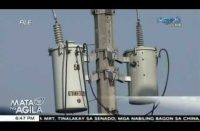(Eagle News) — Metro Manila, Bulacan, Cavite, Laguna, and Rizal will again be under the strictest form of community quarantine amid the surge in COVID-19 cases.
Presidential Spokesperson Harry Roque said on Saturday, March 27, that this was after President Rodrigo Duterte approved the recommendation of the Inter-Agency Task Force for the Management of Emerging Infectious Diseases.
The ECQ in the Greater Manila Area, as the areas are collectively called, will start at 12:01 a.m. on Monday, March 29, and will end on April 4.
“Homeliners”
Under the ECQ, Roque said residents of those areas are again required to remain as “homeliners,” and can only leave their homes to work in industries that are allowed to operate under the community quarantine, if they are authorized persons outside residences, and to avail of necessities.
He said the presence of uniformed personnel for the enforcement of health protocols will be heightened.
“Although andiyan uli ang checkpoints, pakiusap sa mga checkpoints, wag haharangin ang mga cargo lalo na ang may dala na pagkain dahil pag di nakapasok sa Greater Manila area ang pagkain, baka magutom tayo,” he said.
House-to-house to check for suspect COVID-19 cases
He said the national task force, other agencies and local government units shall implement steps for the prevention, detection, isolation and treatment of COVID-19 cases.
Roque said Dharavi-like centers at the community will look for suspect cases, and test, contact trace, and isolate.
He said LGUs should isolate, test, and contact trace suspect cases within 24 hours of their detection.
“Magbabahay bahay po tayo na maghahanap na may mga taong may sintomas,” he said.
Priority construction projects, public transportation to operate
Under the ECQ, Roque said essential and priority construction projects, whether public or private, shall be allowed to continue based on the guidelines issued by the Department of Public Works and Highways.
The road, rail, maritime, and aviation sectors of public transportation shall also be allowed to operate but “at such capacity and following the protocols provided by the (Department of Transportation).”
Mass gatherings banned
He said mass gatherings, including religious gatherings are prohibited.
Gatherings of more than ten people outside their homes and gatherings indoors with any persons outside of the immediate household are also banned, Roque said.
He said as for weddings and funerals, only the immediate families not exceeding ten members, are advised to attend.
Those below 18 years old and over 65 years old; those with immunodeficiency, comorbidity or other health risks; and pregnant women are not allowed outside, unless they need to avail of essential services , work in permitted offices, or are classified as APOR.
Curfew
There will also be a curfew from 6 p.m. to 5 a.m. in the areas covered by the ECQ, Roque said.
APORs, workers cargo vehicles, and public transportation, however, he said, are not restricted by the curfew, but should present the proper identification.
No dine-in in restaurants
Mall operations shall be restricted to the operations of essential stores such as hardware stores, pharmacies, and groceries.
Restaurants shall be allowed to operate but only for takeout and delivery services.
According to Roque, affected workers shall be given cash aid.
The Philippines is currently dealing with a surge in COVID-19 cases, a fact Roque attributed to the presence of COVID-19 virus variants.
He noted that other parts of the world were dealing with surges, which only goes to show, he said, that “talagang ang virus ang kalaban, hindi ang gobyerno, di ang IATF.”
He said the surge had rendered Metro Manila’s healthcare utilization rate at a “critical” level,
On Friday, the Philippines confirmed an all-time high of 9,838 additional COVID-19 cases.





